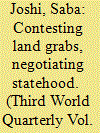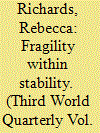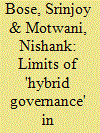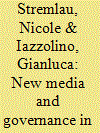| Srl | Item |
| 1 |
ID:
174556


|
|
|
|
|
| Summary/Abstract |
In Cambodia, rural citizens embroiled in protracted land grabbing cases with the state and private companies are turning increasingly to international accountability mechanisms for resolution. This article applies the interlinked concepts of hybrid governance and legal pluralism to understand the prospects and limitations of ‘forum-shopping’ through appeals to international mechanisms for rural communities affected by land grabs. Drawing on interviews and using process tracing, it examines the outcomes of a mediation case filed with the International Finance Corporation’s Compliance Advisor/Ombudsman (CAO) involving indigenous groups and a Vietnamese rubber company in north-east Cambodia. It argues that while international accountability mechanisms yield platforms for dispossessed groups to assert claims, they also reify choices between entitlements and attainability without circumventing the problems associated with justice delivery under Cambodia’s authoritarian regime. Overall, this study highlights the interaction, competition and collaboration between distinct forms of regulatory authority exercised by national and transnational actors involved in land grabbing cases in Cambodia, demonstrating their role in ‘negotiating statehood’ by governing local claims to land.
|
|
|
|
|
|
|
|
|
|
|
|
|
|
|
|
| 2 |
ID:
171931


|
|
|
|
|
| Summary/Abstract |
Even in the context of a relatively flourishing state, fragility can be an enduring feature of a political system, particularly in the case of recently established or unrecognised states. This article examines the nature of state-building in a specific context to question the assumption that forms of hybrid governance or pre-existing forms of governance are a necessary evil to be tolerated but which needs ultimately to be overcome during state-building. It does this by adopting the language of resilience and focusing on the case of Somaliland to highlight the role of clan governance as a mechanism of political resilience and as a means of promoting the flexibility required for state-building. Yet, at the same time, the process of state-building often involves formalising governance and limiting the role of traditional social-political forms of governance such as clans, ignoring their role in legitimating and stabilising the political system. However, as this article argues, stability and fragility are inextricably linked; while the clan system has been an important force in stabilising the state, it has also become a pressure point for the state’s latent fragility. By contextualising fragility and stability within the language of resilience, though, this symbiotic relationship can be better analysed.
|
|
|
|
|
|
|
|
|
|
|
|
|
|
|
|
| 3 |
ID:
133595


|
|
|
|
|
| Publication |
2014.
|
| Summary/Abstract |
The following commentary argues that the strategic and structural solutions proffered by advocates of 'hybrid' governance-encompassing elements from distinctly different ideological backgrounds or schools of thought-ignore or fail to address certain inherent shortcomings in their approach that are counter-productive to the ongoing and long-term statebuilding and peacebuilding projects in Afghanistan. The following study elucidates some of these shortcomings.
|
|
|
|
|
|
|
|
|
|
|
|
|
|
|
|
| 4 |
ID:
154789


|
|
|
|
|
| Summary/Abstract |
The role of new media in shaping the interactions of formal and informal leaders with their audiences is frequently misunderstood and often narrowly focussed on electoral processes and political competition. By weaving together strands of scholarship on political communication and political settlement while engaging with concepts of hybrid governance and leadership more prevalent in the African studies literature, this article takes a different, wider focus. We attempt to knit a framework that challenges normative assumptions on institutional communicative practices and considers the role of power, leadership and communications in both exacerbating and mitigating violent conflict in emerging and consolidating democracies. By bringing together disparate strands of scholarship that are rarely in dialogue, we question a characterisation that contrasts vertical mainstream media with more horizontal and inclusive social media, arguing that a more nuanced view of the political significance of these spaces is required, one that highlights their interplay and blurs the boundaries between online and offline. In doing so, the article places power at the centre of analysis to examine how entrenched relations of patronage can be left unscathed, transformed or even reinforced by networked forms of communication.
|
|
|
|
|
|
|
|
|
|
|
|
|
|
|
|